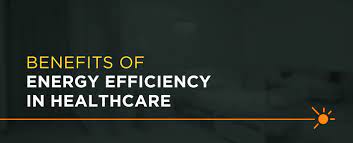Introduction
When healthcare organizations struggle to maintain their budgets and respond to new regulations, energy efficiency has become an important topic for many hospitals. Energy costs can make up as much as 20 per cent of your annual operating budget, and even minor improvements in energy efficiency can improve operational efficiency and reduce operating costs. That’s why it’s essential to understand the benefits of working toward energy efficiency in your facility—and how they apply to your situation. We’ll look at some of these benefits below: shared by Local Law 84 service provider.
I am saving money.
One of the most important benefits of energy efficiency in healthcare is that it can save money. Of course, the amount of money you save will depend on how much energy your facility currently consumes, how much energy you use per square foot, and how efficiently those resources are being used. In general, however, the savings from reducing or shifting to renewable sources can be significant. For example:
- Reducing your building’s total primary electricity use by 15% would result in annual savings between $50,000 and $100,000, depending on local utility rates.[3]
- Using renewable energy instead of grid power for heating or cooling could reduce annual costs by as much as 30%.[4]
We are improving patient care.
The benefits of energy efficiency in healthcare are numerous, but perhaps the most important is that it helps you achieve your goals more efficiently. When you improve the efficiency of your operations and reduce costs, you can use those savings to provide better care for patients or enhance your services. By cutting energy waste, you’ll also be able to reduce staff workloads and increase employee job satisfaction, encouraging them to stay at their jobs longer.
This leads us to another benefit: reduced turnover rates. If you want a well-trained workforce, then investing in efficient systems will help ensure that you have one. In addition, the increased productivity and improved morale will lead to higher retention rates among doctors and nurses, which means fewer vacancies at your facility.
This can also help improve patient satisfaction scores because they know they’re getting better care from an energized team who isn’t constantly exhausted due to stressful working conditions caused by inefficient systems/equipment like excessive lighting levels or faulty
HVAC equipment that uses too much electricity when trying not only to keep everyone cool during summer months but also keeps everyone warm during winter months as well (mainly if heating units are being used)—in short, making more intelligent decisions about how time should be spent working around these issues instead of just letting things happen organically without any direction!
We are reducing operating costs.
Reducing operating costs is the most obvious benefit of energy efficiency. Facilities that can reduce their consumption of power and water will experience a decrease in their operating expenses. The savings can be significant, as large amounts of money are spent on utility bills every month:
Reduce energy costs by reducing consumption; save directly on electricity, natural gas, and water bills. New Power has a variety of energy plans
Reduce maintenance costs by extending equipment lifetimes through preventative maintenance programs; reduce the need for repair or replacement equipment. If you’re looking to reduce your energy costs, New Power has a variety of energy plans that can help. Homeowners in Texas may save money on their monthly energy bills and on their electric bills in the long run thanks to substantial discounts and credits for energy use.
Reduce capital costs by increasing the lifespan of existing assets; decrease the need for new build-outs or replacements with more efficient alternatives that require less space.
We are enhancing staff productivity.
- Reduced Energy Costs: Healthcare facilities can save up to 30% on energy costs when implementing an energy efficiency program.
- Reduced Carbon Emissions: When you save money on your electricity bills, it helps reduce the number of greenhouse gases that your facility is releasing into the atmosphere.
- Less Time Spent on Maintenance and Unplanned Power Outages: Less time spent dealing with equipment failures means more time for staff members to focus on patient care instead of repairing broken or malfunctioning machines or fixing power outages.
- Less Time Spent Replacing Equipment Due to Breakdowns: Not only does this mean less downtime for patients, but it also means less wasted money hospitals spend on new equipment every year!
We are extending the life of equipment and facilities.
Energy efficiency can help extend the life of equipment and facilities, meaning you can avoid costly repairs, replacements, and upgrades. For example, a hospital in California saved $50 million by replacing older heating, ventilation and air conditioning (HVAC) systems with ones that use 40 per cent less energy.
As we’ve seen above, there are many benefits to energy efficiency in healthcare—and they only get better when combined with other intelligent technologies. For example, ENERGY STAR® smart lighting controls can automatically dim or turn off lights when rooms are empty or at night—helping you save even more money on your utility bills while reducing carbon emissions.
We are improving air quality and limiting pollutants in the environment.
To reduce the emissions from power plants, factories, and vehicles—all of which contribute to air pollution—healthcare facilities should implement energy efficiency measures. Air pollution can negatively affect human health in several ways:
- Air pollution can cause respiratory problems, including asthma and lung cancer
- Air pollution can lead to heart disease (e.g., stroke) or premature death
We are reducing the environmental impact of energy use and pollutants associated with energy generation.
Using electricity causes pollution from carbon dioxide emissions, which contributes to global climate change. In addition, burning fossil fuels, such as coal and oil for electricity generation and transportation produces pollutants that can harm human health.
There are also other sources of environmental impact associated with the generation of energy:
- Waste heat from power plants is released into the atmosphere. This increases local temperature and can cause air pollution by increasing ozone levels in cities or warming water bodies close to power stations where they meet local air currents, potentially increasing evaporation rates.
- Water used in energy production and consumption must be treated, so it does not contaminate nearby waterways with toxic chemicals or bacteria from sewage treatment plants (STPs).
- STPs often discharge treated water directly into lakes or rivers without adequately treating for heavy metals first because these facilities were built before most regulations existed regarding STP water quality standards; therefore their presence is an issue across many developed countries like Canada where we have a high rate of STP construction since 1960s.
- when nuclear power began expanding rapidly throughout North America including Ontario province where much land has been converted from forests into industrial areas like mining operations which require large amounts water flow through pipes carrying ore concentrate back underground again at another location called tailings dams.
- where material needs processed further before being disposed somewhere else away from residential areas near mine sites due to its toxicity levels exceeding safe thresholds set forth by regulators such as OSCR (Ontario Securities Commission) whose mandate includes overseeing compliance with securities laws enacted under provincial jurisdiction only; however some provinces do not have equivalent organizations managing securities regulation such as Alberta.
There are a lot of benefits to working toward energy efficiency, and none of them should be overlooked.
- Energy efficiency is essential for healthcare.
- Energy efficiency is essential for the environment.
- Energy efficiency is essential for the economy.
- Energy efficiency is essential for the future.
Energy efficiency should be an essential part of all healthcare facilities. Still, it’s also a good idea to take advantage of energy-saving methods in your home if you can do so without sacrificing comfort or luxury—everyone deserves healthy living conditions!
Conclusion
In the end, it’s all about saving money. There are a lot of benefits to working toward energy efficiency, and none of them should be overlooked. However, if you have been thinking about making some changes in your building or campus but aren’t sure where to start, we hope this information has helped! This Article is written by nycbuildingbenchmarking.




























